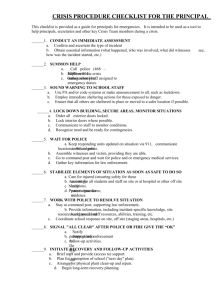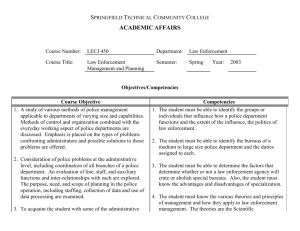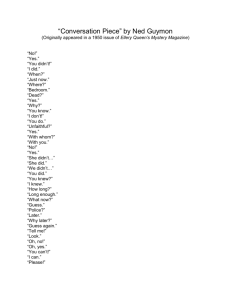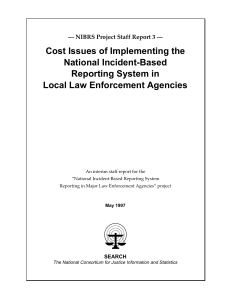Arg Essay 2 - WordPress.com
advertisement
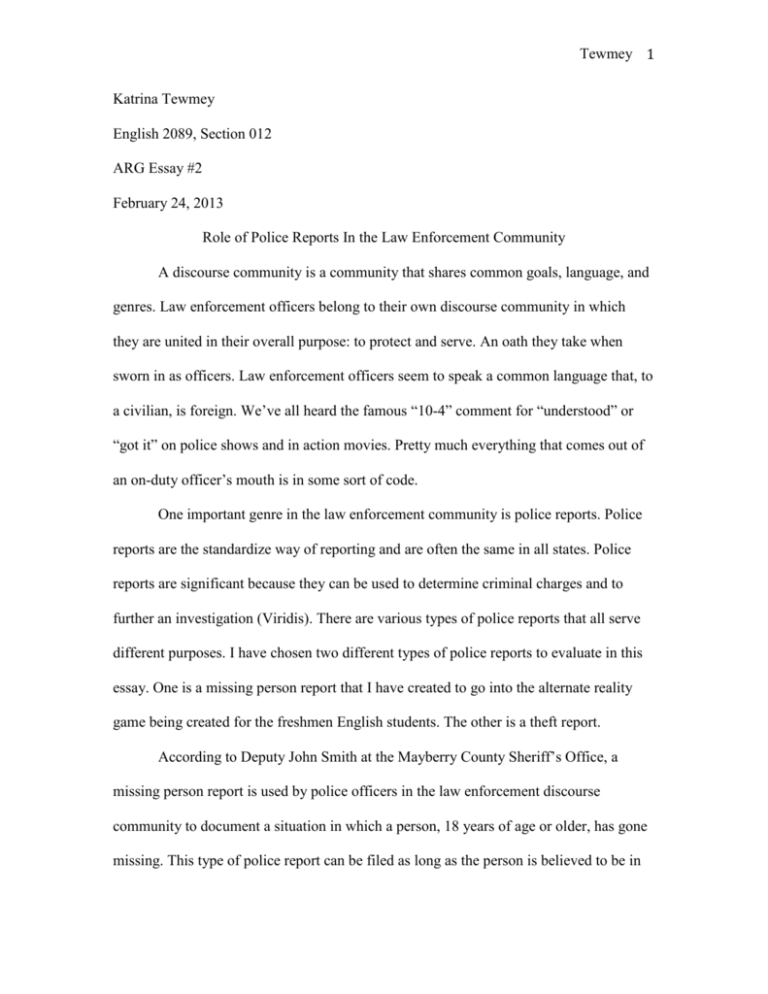
Tewmey 1 Katrina Tewmey English 2089, Section 012 ARG Essay #2 February 24, 2013 Role of Police Reports In the Law Enforcement Community A discourse community is a community that shares common goals, language, and genres. Law enforcement officers belong to their own discourse community in which they are united in their overall purpose: to protect and serve. An oath they take when sworn in as officers. Law enforcement officers seem to speak a common language that, to a civilian, is foreign. We’ve all heard the famous “10-4” comment for “understood” or “got it” on police shows and in action movies. Pretty much everything that comes out of an on-duty officer’s mouth is in some sort of code. One important genre in the law enforcement community is police reports. Police reports are the standardize way of reporting and are often the same in all states. Police reports are significant because they can be used to determine criminal charges and to further an investigation (Viridis). There are various types of police reports that all serve different purposes. I have chosen two different types of police reports to evaluate in this essay. One is a missing person report that I have created to go into the alternate reality game being created for the freshmen English students. The other is a theft report. According to Deputy John Smith at the Mayberry County Sheriff’s Office, a missing person report is used by police officers in the law enforcement discourse community to document a situation in which a person, 18 years of age or older, has gone missing. This type of police report can be filed as long as the person is believed to be in Tewmey 2 danger, has gone missing against their will, or is mentally disabled. A missing person report is considered to be an incident report. In an incident report, the person reporting is often a family member or a friend. It’s usually not the victim them self reporting. Also, there is no criminal activity reported in an incident report. If a person goes missing and there is a suspect involved, it becomes a criminal case and a kidnapping report is used (Smith). A theft report, according to Deputy Smith, is often reported by the victim or the representative of a business that has been the target of a theft. A theft report, unlike the missing person incident report, is a report of criminal activity and is often called an offense report. Certain information, such as, property taken and the price of the property taken, is collected to help build a criminal case. The monetary value of the stolen property determines the charge (Smith). Deputy Smith states that both, a missing person report and a theft report, are generated using a system called National Incident-Based Reporting System (NIBRS). Based on information found on the National Archive of Criminal Justice Data (NACJD), NIBRS is part of a Uniform Crime Reporting (UCR) program in which criminal activity is reported. Incident-based data contains a large amount of complex data that has details about every crime or incident reported (National Incident-Based Reporting System Resource Guide) (Smith). Standard information is collected for every police report. This information consists of the reportee’s name and contact information, time and place of incident or crime, victim’s information, responding officer’s name and badge number, and the officer’s narrative, which is the description of incident (Smith). According to the Federal Tewmey 3 Bureau of Investigation’s website, the UCR requires a law enforcement officer to list at least one bias motivation on offense reports. Some examples of bias motivations are: racial, religious, sexual orientation, ethnicity/nationality, and disability (“Incidents and Offenses”). Anis Bawarshi, author of the book Genre and the Invention of the Writer, talks about different questions to ask when analyzing genre. Based on this information, I have concluded by examining a police report and by interviewing a professional who handles police reports for a living, that all reports are organized in a similar manner. They start with the agency information at the top, the responding officer’s information, and then the person’s information that is reporting. If the victim is different than the reportee, their information is listed next. The last portion of all police reports is an area for the officer to document his personal narrative of the situation. Bawarshi states when analyzing a genre that you should look at the overall tone and the language used. The tone for police reports is a tone that is free from emotion and only presents the facts of the situation. The language used while creating the report needs to be professional for the main reason that it may end up in a courtroom (Bawarshi). In the ARG being created for the freshman class, the role of the missing person report that I have created is to provide information to players regarding the disappearance of the anthropology professor, Minerva Beane. According to the article “Alternate Reality Games: What Makes or Breaks Them?” by Muhammad Saleem, an essential element of a successful ARG is to be able to “blur the lines between reality and fiction.” My missing person report can add to the reality of the ARG because it is an authentic police report, generated using NIBRS, by an actual law enforcement officer. Tewmey 4 In the article “Alternate Reality Games”, Sean Stewart talks about the effectiveness of interactivity and the ability to reassemble a story or change it. He uses the example of getting from point A to point B and allowing players to choose their route and drive the car (“Sean Stewart. Alternate Reality Games”). Players can use the missing person report to build the story of Professor Beane running away or maybe the story will develop into a criminal investigation case of Professor Beane being abducted. I feel like a missing person report leaves the players with many options for deciphering it’s meaning. A missing person report and a theft report are two very important documents that fall into the police report genre used by officers in the law enforcement discourse community daily. Although they have differences, they serve the same overall purpose of gathering and recording information into a database. Tewmey 5 Works Cited Bawarshi, Anis S. "Rhetorical Genre Studies Approaches to Teaching Writing." Genre and the Invention of the Writer: Reconsidering the Place of Invention in Composition. Logan, UT: Utah State UP, 2003. 195-96. Print. "Incidents and Offenses." FBI. N.p., n.d. Web. 23 Feb. 2013. "National Incident-Based Reporting System Resource Guide." National Incident-Based Reporting System Resource Guide. N.p., n.d. Web. 23 Feb. 2013. "ReadWrite." ReadWrite. N.p., n.d. Web. 23 Feb. 2013. "Sean Stewart. Alternate Reality Games." Sean Stewart. Alternate Reality Games. N.p., n.d. Web. 23 Feb. 2013. Smith, John. Personal interview. 22 Feb 2013. Viridis, Marcello. "What Is the Purpose of a Police Report?" EHow. Demand Media, 29 Dec. 2009. Web. 23 Feb. 2013.

